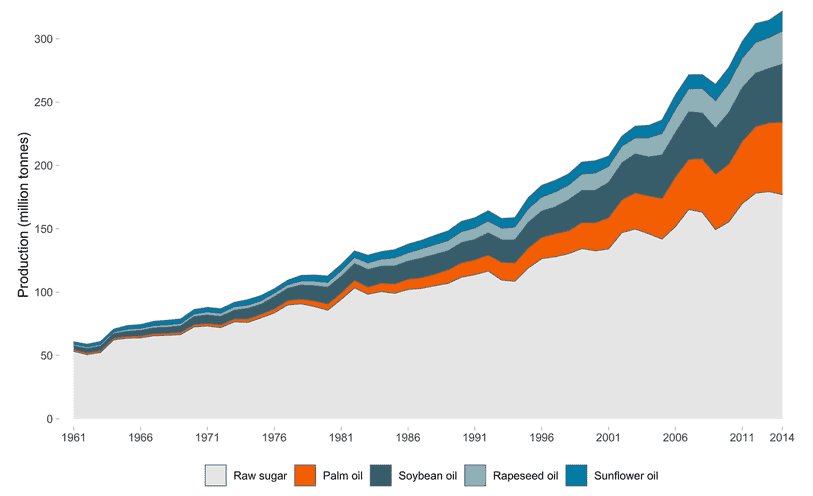
Anishka Ram
(NZRD, MSc. Nutrition and Dietetics)
“Healthy Foods” today are becoming ultra-processed foods (UPF) that remove some of the allergens but have higher amounts of sugar, sodium and saturated fat which are used as fillers.
They provide poor nutrition and consuming them frequently and in large quantities can cause issues with health and digestion.
To know how to differentiate healthy from unhealthy processed foods, you can read in the article below.
Popular Healthy (Processed) Foods
Are you on a keto diet? With all the options available now labelled “not carb” you would think that going low carbohydrate is the best option. Well… the brand new veggie chips in the health aisle may not have carbs but they definitely have more sodium than popcorn.
RELATED — Diet and Performance: High-Carb or Ketogenic Diet?
Or maybe you are gluten-free? Possibly have Coeliac Disease?
RELATED — Coeliac Disease: Symptoms and Effects on our health and body
Now, there are more options than ever that can cater to your diet. Fantastic! However, there is also more possibility to get it wrong as recorded in the 2017 study, where patients with coeliac disease reported higher consumption of added sugar and total fat than healthy individuals.[1]
The image of leafy greens, bright coloured fruits and veggies may not be the correct representation when looking for packaged vegan/vegetarian options as they may be infused with sugar, salt and, at times, saturated fats.
RELATED — The Healthy Plate Model: Essentials of Healthy Eating
Perhaps your diet is fine, but you would like to eat more high protein foods such as protein balls or snack bars. If it’s high in protein, then surely it would be lower in all the other bad stuff? Unfortunately, on top of the high sugar content, these products may indicate a higher serving size.[2]
RELATED — Diet and the Brain: Our brain on sugar

As we can see in the chart above, there has been a steep increase in use of sugar and palm oil in processed foods.[3]
"Healthy" or unhealthy processed food - how to know?
Some healthy foods are most likely unhealthy but have been repackaged and rebranded to appeal to the large diet culture trend.[4]
We saw a similar issue with products aimed at weight loss by claiming that their food item had reduced carbs, sugar or fat. Now we know that when there is less of one of these nutrients, it is mostly replaced by the other two.[2]
For example, almond milk is a popular alternative to cow’s milk. Yes, almond milk is low in saturated fats and high in good fats, but depending on the brand and label it can have more sugar, artificial sweeteners, flavourings, preservatives and have small amounts of protein.
RELATED — Artificial Sweeteners: Are they a healthy alternative to Sugar
One of the main reasons is to make sure that the new ‘healthier’ product has the same texture and consistency as the original product and can be manufactured with minimal adjustments in order to keep costs low.
Also, we have learned to alienate one nutrient over the other without considering the whole food, which is contributing to the diet culture.
Read the nutrition label at the back of the product and compare which one has less sugar, sodium and saturated fats.[2,5] Soon, you will know which products are better and a healthier option.
If you would like to know when similar articles will be coming out, you can Subscribe to our Newsletter and we will let you know well in advance.
References
(1) Babio, N., Alcázar, M., Castillejo, G., Recasens, M., Martínez-Cerezo, F., Gutiérrez-Pensado, V., … & Salas-Salvadó, J. (2017). Patients with celiac disease reported higher consumption of added sugar and total fat than healthy individuals. Journal of pediatric gastroenterology and nutrition, 64(1), 63-69.
(2) Melini, V., & Melini, F. (2019). Gluten-free diet: Gaps and needs for a healthier diet. Nutrients, 11(1), 170.
(3) Baker, P., Machado, P., Santos, T., Sievert, K., Backholer, K., Hadjikakou, M., . . . Lawrence, M. (2020, 08 06). Ultra-processed foods and the nutrition transition: Global, regional and national trends, food systems transformations and political economy drivers.
(4) Kaur, A., Scarborough, P., & Rayner, M. (2017). A systematic review, and meta-analyses, of the impact of health-related claims on dietary choices. International Journal of Behavioral Nutrition and Physical Activity, 14(1), 1-17.
(5) Hieke, S., Kuljanic, N., Pravst, I., Miklavec, K., Kaur, A., Brown, K. A., … & Rayner, M. (2016). Prevalence of nutrition and health-related claims on pre-packaged foods: A five-country study in Europe. Nutrients, 8(3), 137.






